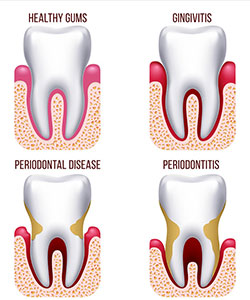Gum Disease
Maybe it is your problem

It hides in your mouth, destroying gum tissue and teeth, and it can lead to strokes, heart attacks, and pregnancy complications. Don’t think it’s your problem? Conservative estimates report that up to 80 percent of the population unknowingly has gum disease in some form.
Seventy percent of adult tooth loss is attributable to gum disease. Recent research shows a link between patients who have gum disease and those who suffer from strokes, heart attacks, or complications with diabetes or pregnancy. Gum disease is silent, in that early symptoms may be painless and mild, like swollen gums or bleeding while brushing.
Regular dental checkups are vital because a professional can detect, treat, and reverse gum disease in the early stages before major problems arise.
Cause and effect
Several factors contribute to periodontal disease: plaque buildup, heredity, and lifestyle choices. By far, the most common and controllable factor is bacterial plaque — the sticky, colorless film produced by normal oral bacteria. Bacteria release toxins that break down the natural fibers that bond gums to teeth.
When this occurs, pockets form between the gums and teeth, and more bacteria and toxins hide, flourish, and destroy your gums and teeth. Over time, this process can affect not only gums, teeth, and bone within the mouth, but also overall health. Bacteria in your mouth will be inadvertently ingested, and this can compromise your whole-body health.
Maintaining good periodontal health
Regular dental visits at least every six months enable us to keep a watchful eye on the health of your gums. You should also brush twice a day, floss once a day, and use good mouth rinses at home.
We will recommend the products that can optimize your oral homecare, and we can also show you the best methods for brushing and flossing. If you have overcome periodontal disease, we will recommend frequent checkups to ensure your mouth stays healthy for a lifetime.